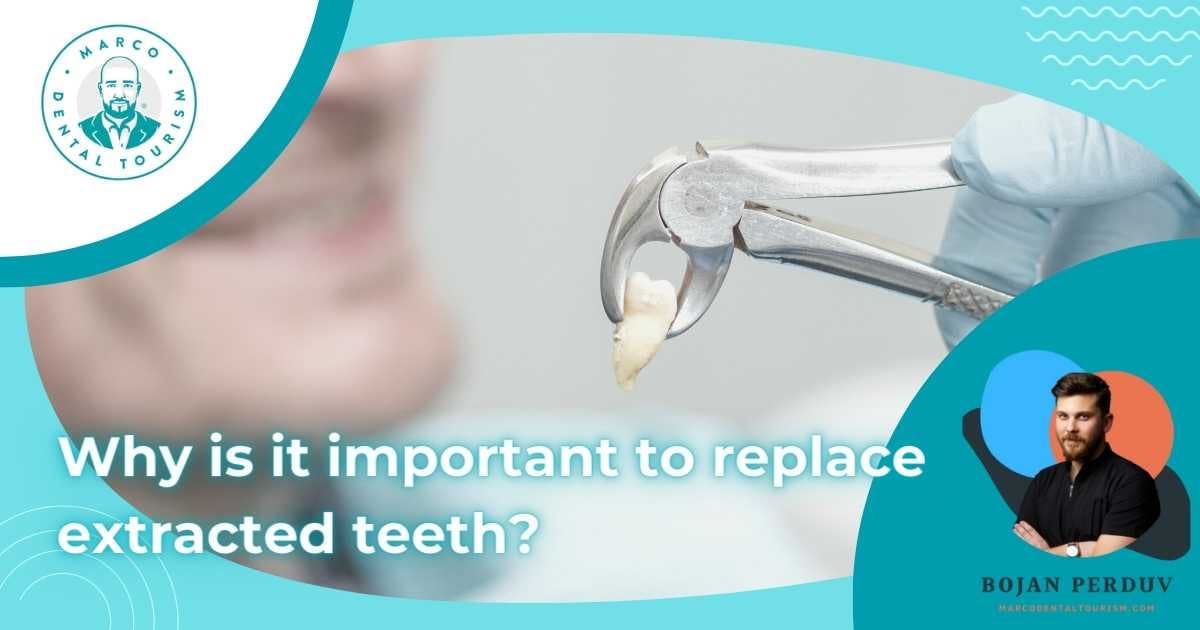
In this text, we discuss why it is very important to replace extracted teeth for medical and aesthetic reasons. We will provide you with useful information about in which cases it is necessary to extract a tooth, about the latest methods of replacing missing teeth, as well as ways in which you can choose the best option for yourself.

Tooth extraction is a dental procedure that involves removing a tooth from its socket in the jawbone. It is usually recommended for extensive damage to the tooth that is causing pain or infection. The procedure is usually performed by a dentist or oral surgeon and can be performed under local or general anesthesia.

Tooth extraction is most often necessary when the tooth is severely decayed, infected, or damaged and cannot be repaired. Other reasons for extractions may include overcrowded or misaligned teeth, as well as preparing the jaw for orthodontic treatment.

Wisdom tooth extraction is recommended in cases where the wisdom teeth are impacted, infected, and cause damage to neighboring teeth. In addition, if there is not enough room in the mouth for wisdom teeth to erupt properly, they may need to be extracted. Wisdom tooth extraction is always done in consultation with a dentist.
After tooth extraction, the dental alveolus fills with a blood clot that protects the area during wound healing. Over time, the bone in the alveolus will be filled with new bone tissue, and the gum tissue will also heal. The process takes several weeks, which is why it is crucial to follow the recommended care instructions.
How to speed up the healing of a tooth wound?

To speed up the healing of the wound after tooth extraction, keep the area clean, avoid smoking and eating hard food. You apply ice packs, rinse your mouth with salt water and use the prescribed medication according to the instructions. Avoid heavy physical activity and rest as needed.
How do missing teeth affect chewing function?

Missing teeth can affect the function of chewing by reducing the biting surface, changing the direction of the bite force, and causing movement of adjacent teeth. This can lead to difficulty chewing hard and sticky foods and inadequate absorption of nutrients causing digestive problems.

Ways to compensate for extracted teeth are dental implants, bridges and dentures. Implants are a popular choice due to their durability and natural appearance. Bridges are fixed prosthetic devices that are attached to adjacent teeth to fill the gap, while dentures are removable and can be partial or complete.
What are dental implants and how can they replace teeth?

Dental implants are artificial tooth roots that are surgically implanted into the jawbone to support a replacement tooth or bridge. They are made of biocompatible materials such as titanium, which fuses with the bone of the tooth, forming a stable base for the replacement tooth. They are a long-term and effective solution for extracted teeth.

Prostheses help with extracted teeth by restoring the proper functioning of the jaw, improving speech, the ability to chew, as well as the overall aesthetics of the smile. Also, when one or more teeth are extracted, dentures can provide support to the surrounding tissues and prevent bone loss.
After tooth extraction, it is necessary to wait 4-6 weeks for the gums to heal properly before placing the prosthesis. During the first examination, impressions of the gums are taken in order to make a custom-made prosthesis. During the next visit to the dentist, the prosthesis is tried on and placed in an adequate and comfortable position.

A dental bridge can replace a missing tooth after extraction by attaching it to other teeth with dental crowns. A bridge fills the gap with a false tooth that looks and functions like a natural tooth. This helps restore the ability to chew and speak properly, as well as improve the appearance of the smile.
The process of replacing extracted teeth usually takes several months and includes several steps such as bone grafting and implant placement. After that, it can take up to 6 months for the implant to completely fuse with the jawbone. A permanent crown is placed on top of the implant, which restores the function and aesthetics of the tooth.

For oral health, it is important to replace extracted teeth because missing teeth lead to a number of problems such as tooth decay, gum disease and bone loss. In addition, replacing extracted teeth can improve speech, restore self-confidence, and improve the general quality of life.
Here are a few more reasons why it is important to replace extracted teeth:
- Prevention: When a tooth is extracted, the jawbone beneath it begins to decay. Replacing a tooth with an implant or a bridge helps to stimulate the bone, preventing its further damage.
- Maintaining a proper bite: Missing teeth can cause adjacent teeth to shift, causing an improper bite that can lead to pain, discomfort, and even gum disease. Replacing extracted teeth can help maintain proper alignment and prevent future dental problems.
- Improving speech and chewing ability: Missing teeth can make it difficult to eat certain foods and speak clearly, which affects self-confidence and quality of life. Replacing extracted teeth can effectively restore speech and improve general dental and overall health.
Our conclusion
To summarize, taking care of oral health is not only maintaining the aesthetics of the smile, but also preserving the vitality of the entire organism. Replacing extracted teeth plays an essential role in preventing further dental complications and improving the overall quality of life. So, don't neglect the importance of dental health, visit the dentist every six months for regular check-ups and take the necessary steps to keep your smile healthy and shiny forever.
















Share your opinion!
What do you think about this topic?
Comments (0)